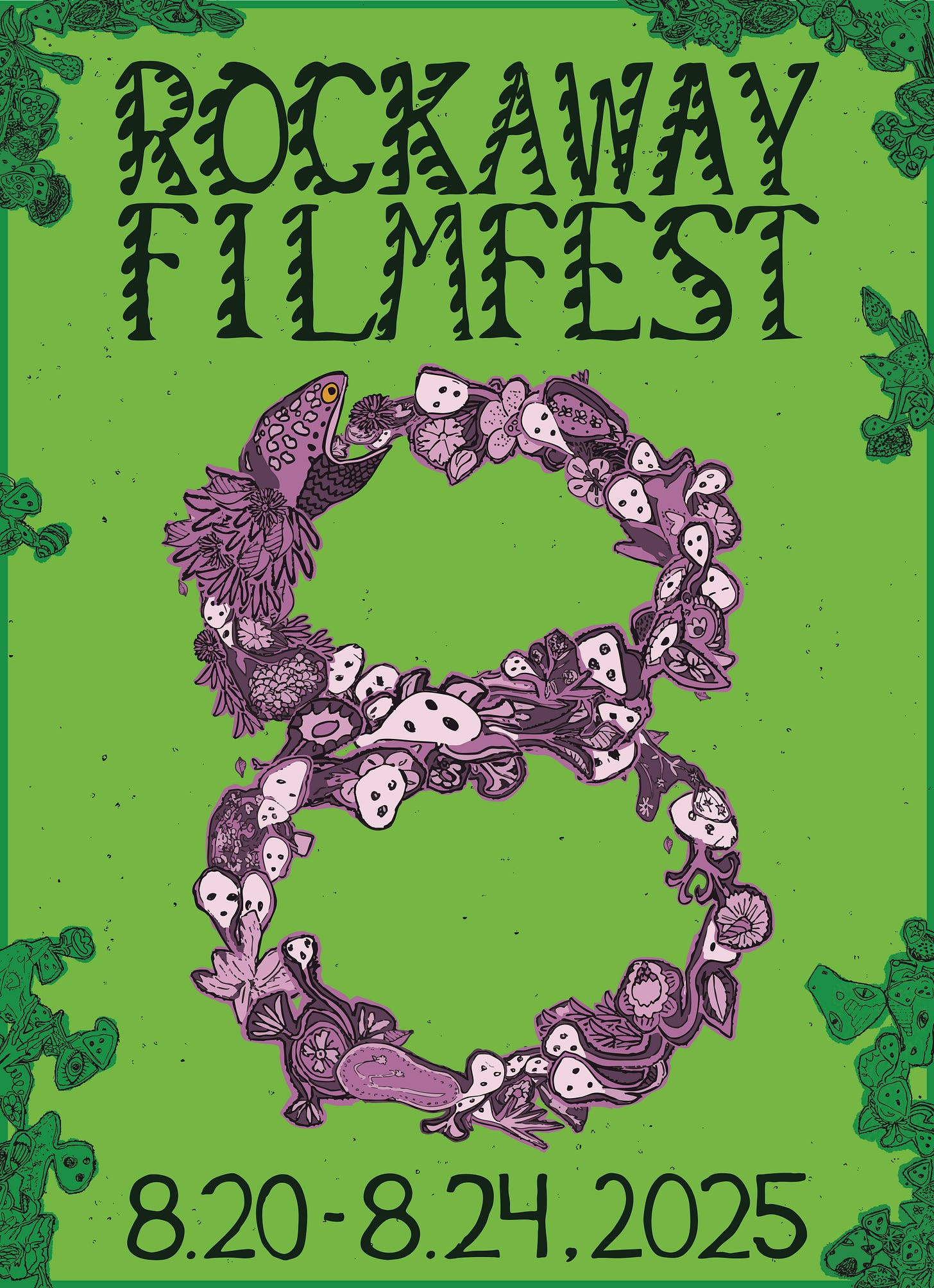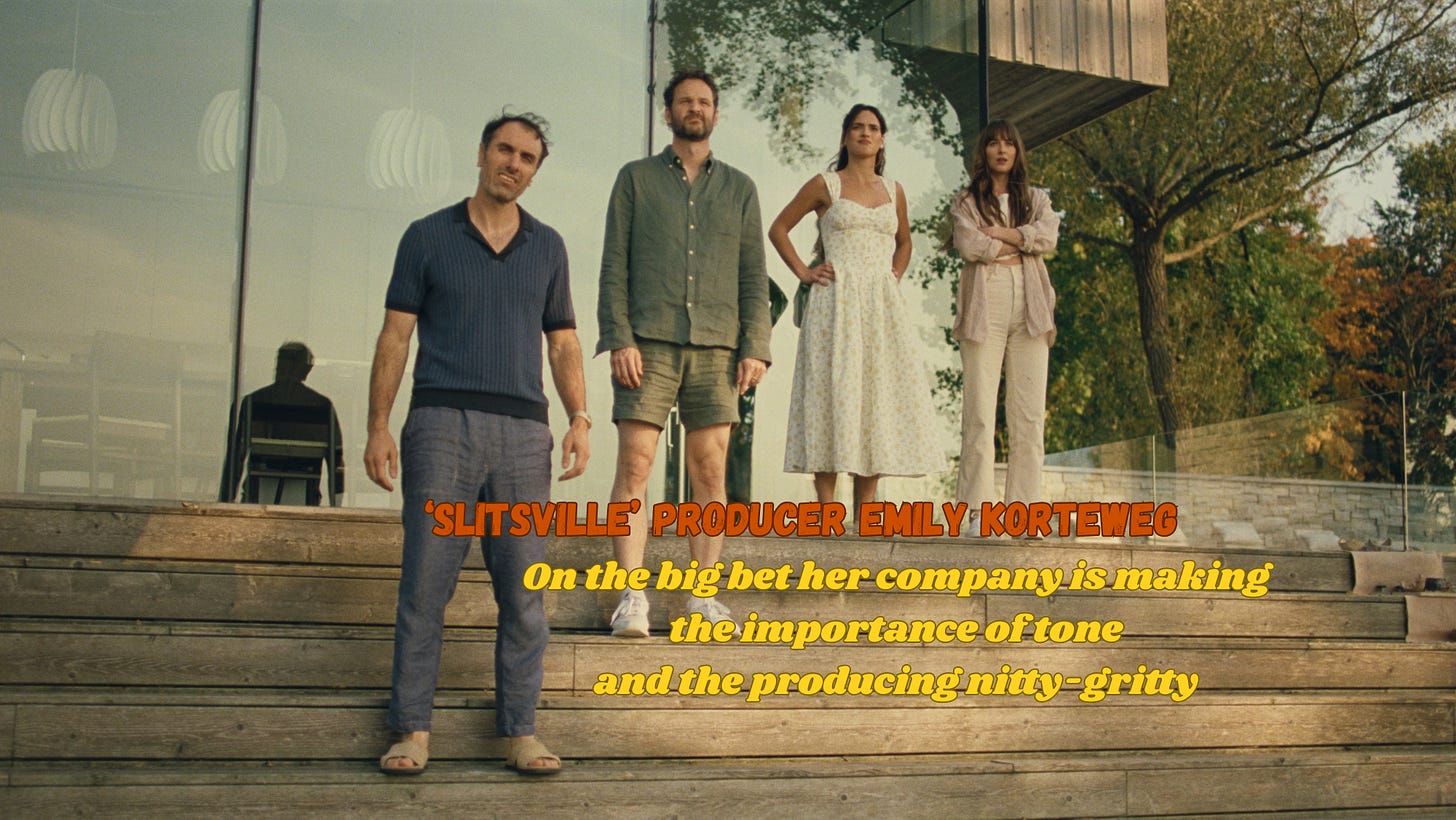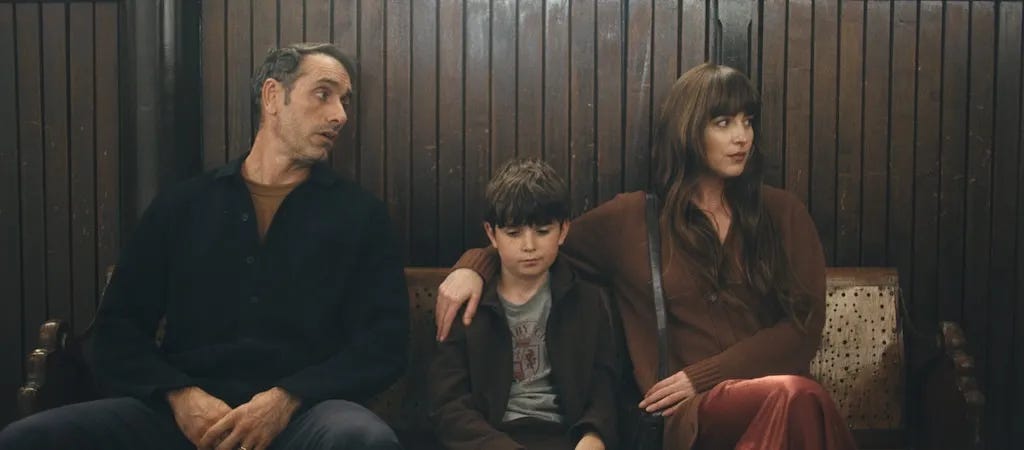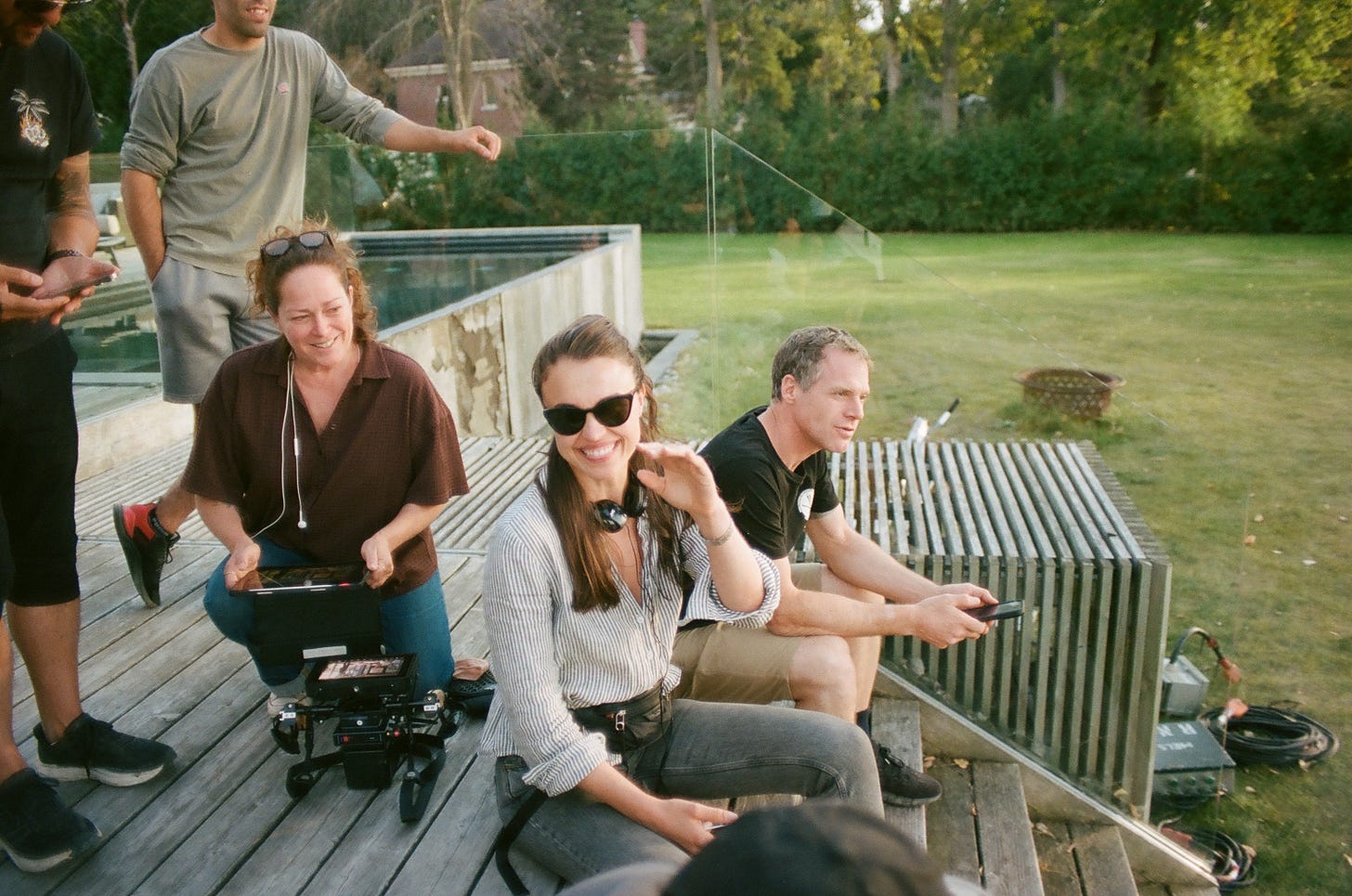The Most Important Ingredient in 'Splitsville'
Producer Emily Korteweg on why tone is everything.
Hello! Late August isn’t usually a great time for moviegoing, but this year there’s a lot to be excited about. Two of my favorite movies of the year so far, Splitsville (the subject of today’s newsletter) and Lurker, hit select theaters August 22. There’s a new Spike movie. There are several fun rep series’ happening. And Wednesday marks the start of this year’s Rockaway Film Festival. Which brings me to…
SCREENING OF THE WEEK
Rockaway Film Festival
August 20 - 24
Rockaway Film Festival is a fun way to spend a late summer day pretty much no matter what’s playing. But this year’s lineup is jam-packed with films I’m dying to see, including Xander Robin’s Python Hunt, the Sundance Grand Jury-winning Atropia, and what I’m being told is a very strong shorts lineup. I’ll be out of town most of this week, but planning to be there closing night. Say hi!
THE FEATURE ATTRACTION
The Most Important Ingredient in 'Splitsville'
Producer Emily Korteweg on why tone is everything.
About a year and a half ago, I visited Emily Korteweg, the EVP of a young production company called Watch This Ready, at their New York office. Korteweg showed me a shelf full of now iconic movies, predominantly from the late 20th century, and told me that this was the company’s goal. They wanted to make ambitious films from visionary filmmakers that were original, entertaining, and appealed to people beyond the coasts. Part of me thought, Hell yeah. And another part of me thought, OK, but who doesn’t?
Making artful hits is, of course, easier said than done. Many companies have had the same goal only to realize that they couldn’t make their hits artful or that they couldn’t make their artful films hits. At the time, Watch This Ready — which Korteweg runs with filmmakers Michael Angelo Covino and Kyle Marvin — had had some success. Covino’s first directorial feature, The Climb — which starred him and Marvin — premiered to strong reviews at Cannes in 2019, and it performed relatively well given its meager budget and its early pandemic release. And 80 For Brady, Marvin’s first directorial feature, did well at the box office, finding fans, in particular, among women and people over 55.
I imagine, though, that the company’s newest film, Splitsville, is what Korteweg really had in mind when she mentioned the company’s aspirations. Splitsville, which was directed by Covino and stars Dakota Johnson and Adria Arjona alongside Covino and Marvin, is exactly the type of original, adult entertainment that everyone’s always bemoaning doesn’t get made anymore. Its characters are complicated, it’s packed with ideas, it’s riotously funny, and it takes big swings. And though the film may call to mind old hits, it doesn’t feel like a relic of some past era. It’s extremely current in its subject and its antic tone feels fresh. I came out of a preview screening buzzing, eager to recommend it to anyone who would listen.
Whether the fun of the film is infectious enough to make it a sensation remains to be seen (it hits select theaters August 22). But regardless of how it performs, this is one of the most exciting new releases — and one that’s very promising with respect to the bet Watch This Ready is making. Here, Korteweg talks about producing Splitsville, her approach to casting, and what Watch This Ready is looking for in future projects.
Tell me about the development process on Splitsville.
Emily Korteweg: With Splitsville, because it was incepted by Mike and Kyle, I was there from the start and therefore part of the shaping of the initial concept, knowing where it came from, etc. We pitched it to Topic. They wanted to commission the script for it. So the guys started writing, and because of my setup with them and how we work generally, I was extremely involved. It's not just they send a draft, I read it. I get pulled into scenes with them and give them feedback in real time. You can't have that setup with every project, but for the type of producing I do, and we do, being that mind-melded with the filmmaker is so invaluable for the rest of the process.
I imagine that process is very organic. But I wonder if there was a theme to the different notes you were bringing?
I'm fortunate that I was working with a director I deeply trust, and he and Kyle surpass me in terms of their experience. There's a fun dynamic between us when it comes to comedy. They're so well-versed in it, and they master a unique tone. And so I learn from them and have learned to let jokes go further. But in turn, I’ve found that they come to me to see where to throttle back. Finding that elegant balance is really important.
Mike and Kyle’s priority is character, not plot, and mine is too. And I think specifically the women in this one I helped shape in some ways. And that was very organic.
And then, going for the visceral but keeping it truthful. That's very much what we were looking for. Because people, when angry or in love, will do absurd things, and when in pressurized situations those absurd things become reasonable.
Can you get a little more specific about where those productive tensions resulted in something concrete?
Without giving too much away, the Ashley character, played amazingly by Adria Arjona, has less real estate in the script, less screen time, but she's extremely dynamic when she's there. We don't care about making likable characters. And with her specifically, I wanted to really drill down on where she came from and where she was going — her arc. She starts off as this wild character who is deeply sincere in her explorations of new experiences, but seeks them out in quixotic corners. She reads self-help books, she probably watches inspirational Youtube videos, and speaks with these platitudes she finds in there. In the beginning of the film, they're thin. But by the end, that dumb platitude is actually true and profound. "Happiness is transient. We move in and out of it," for instance.
With Julie, played by Dakota Johnson, that's a woman who tries to keep it all together, and similarly slowly rips at the seams and explores her own path and choices. A studio often asks for a clear, tangible reason why someone does something. But in truth people might do something that's for a subconscious reason they don't yet understand themselves. So weaving the deeper conflict inside someone into a character who people relate to is also a fun challenge.
And then, I don't want to take much credit for this, because it was really the filmmakers, but there's a grand romantic gesture in this film, and if you understand it, it is so profoundly heartbreaking and beautiful, coming from Paul (Michael Covino). And making that felt by the audience was a similar conversation. Because it's all subverted. We're setting up the audience to think they're getting a romantic comedy, and they are, but they're actually getting one with a very different ending and a different journey that might be more satisfying than a more conventional romantic comedy would be. But that was challenging to pull off.
You mentioned it was challenging subverting the romantic comedy setup. Tell me about how you figured that out.
Again, props to the filmmakers. The answer to that — and something we as a company look for in other filmmakers we work with — is tone. More than plot I think you have character and tone. And tone is a nearly intangible amalgamation of many, many things. It's voice. In this case, tone is the thing that imbues the entire fiber of the story, of the movie — the color, all those things. When I say it's not conventional, I'm really referring to that tone. With all of that said, our goal was to make something for wide audiences in that unique tone, not just for the coasts. And I'm excited to see how that connects and if the marketing reaches these people.
I'm curious about the casting process. How did you think about casting the movie around Michael and Kyle?
Mike and Kyle were set from the beginning. It's awesome that our partners, Topic and then Neon, were fully on board with that. And the first key piece was the Julie role. She would anchor it from a financial standpoint, but she's also a key part and she would very much define who Ashley would be. It can't be two similar people. And those four needed to work. We were very lucky that Dakota Johnson wanted to join the movie. She deeply understood it. And she has such an honest and organic way of both being hyper prepared but also letting it feel loose. And she is very distinct in what she does. Then knowing that, we did know what the rest should be.
Outside of the leads, the casting process naturally shifted. Ashley’s character has a string of boyfriends, and we saw a ton of people for those parts. One of them ended up being Charlie Gillespie. I can’t wait for more people to discover him through this movie. We auditioned a lot of actors for that role — some really established names — and honestly, they were all fantastic. We had an embarrassment of riches. But sometimes you’re chasing something you can’t just “perform” — a quality someone simply embodies. On God’s Time, finding Liz Caribel Sierra for her very first film was one of my favorite discoveries. And with Charlie, it was the same. We watched his tape, then got on Zoom, and it was immediately clear. Yes, he’s talented, but more than that, he just is who he is — and it was electric. We turned down bigger names to go with him, and it paid off. He brought a vibrancy to the role we couldn’t have manufactured, and every time we threw him something, he met it with ease and authenticity.
It seems like Michael is very good at getting the best out of actors. Are there different things you've noticed about how he works with actors that someone who wasn't in the room wouldn't know?
The main thing Michael is drawn to and wants is: Do less. Throw it away. Especially with comedy, you are never acting funny. He likes people with a lot of play and people who are open to ideas. But as with The Climb, this was hyper prepared; if someone throws in their own art and it works, it's great.
In the past you described Watch this Ready as being predicated on a bet on films that are smart and entertaining and appeal to people who don't just live in the coasts. I'm curious about that bet you're making and where you see opportunity.
I feel very optimistic about the future of our industry from where we're sitting. I think there's a reckoning that's very natural. In our case, you had streamers come in with some reliance on algorithms that might work for some things but can’t identify as well what I mentioned earlier — tone. We believe it relates back to the foundational human condition. It's subconscious. It’s physical. It’s part of us. It is what can move you to tears when you sit in the opera and a certain aria goes straight through your skin and bones. You can't control it, it just happens. The same thing can occur with storytelling and with cinema. To activate that feeling, you have to connect with what makes us human. And it is the filmmaker who can conduct all the parts of the orchestra that is filmmaking and point it into a direction to touch people. That's a complex way of saying that that is our priority. It starts with the filmmaker, with the voice.
To do that, our company, Watch This Ready, prioritizes the filmmakers who we believe will define cinema. It comes down to telling the stories that we deeply understand, and then executing them in a visceral way — and by visceral, I mean it moves you physically. A bit more grounded way of putting that is: making stuff that's really entertaining and that's timeless, but doing it in a way that's elevated and bold. I feel confident that that's what studios are looking for more and more, because they too want to reach global audiences. If you want to reach everyone, you have to be willing to talk to everyone, and not judge.
Is Splitsville that kind of movie, to you? One that's aimed at everyone.
That is the goal. People might not realize it is. But the way we've framed it is it's not necessarily about open relationships, it's about messy relationships. It's about love being very complicated. In the pursuit of finding it and finding happiness, we all sometimes do really crazy things. And then, yes, doing that with pretty bold moves in the movie I think will get people excited. Because it's different.
I think we need to talk about the big fight scene.
Keep reading with a 7-day free trial
Subscribe to Nothing Bogus to keep reading this post and get 7 days of free access to the full post archives.






